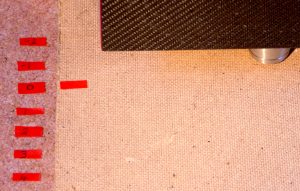Loudspeaker Advice – choosing and positioning
Any component or cable change may well alter the sound balance. Move the speakers to hear the new balance, then judge.
Also you the listener, the room and the loudspeakers are the three greatest variables in any system, so it’s not surprising that speakers are difficult to choose – one reason there’s a lot of advice here.
There’s another point worth making: if you don’t like the sound coming out of the speakers it may not be their fault. They are reproducing whatever is in the chain so don’t rush to change them, ie don’t shoot the messenger!
There’s a lot going on in the system, from the wall plug to the drive unit, that will affect the sound – and then there’s the interaction with the room, including your listening position. Read about room acoustics, ‘old sound’ and speaker positioning: Room acoustics
Positioning loudspeakers
This is such an important subject! Don’t spend big money on big speakers unless you have the room to optimise their position. I may just have saved you a few thousand pounds. (See also the advice below.)
It’s an obvious thing to say but it gets forgotten: remember you are listening to both the speakers and the room, it’s an intimate and interlinked relationship. It’s why positioning is so important and may be the best upgrade you ever make. Also follow the Room acoustics link. If the bass is wrong all music will be slow, sluggish and muddled.
Moving advice
 Place a piece of hardboard (it’s flexible and saves you crawling on knees) about 3 feet long under each speaker, shiny side down if you have carpet or rough side onto a rug on a wooden floor. Mark a reference spot on each piece of hardboard with tape and another alongside it on the floor.
Place a piece of hardboard (it’s flexible and saves you crawling on knees) about 3 feet long under each speaker, shiny side down if you have carpet or rough side onto a rug on a wooden floor. Mark a reference spot on each piece of hardboard with tape and another alongside it on the floor.
Position 1 – listen and make notes.
“Focus” your bass
Choose two or three varied tracks of music with normal bass and keep to them during this stage. Like focussing a lens now slide your speakers backwards and forwards, initially in coarse increments and later in fine changes, down to 2-3 millimetres, seriously. Check speakers are exactly equidistant from the listening seat.
At each change mark the floor alongside the reference tape and number it. Make critical notes of the differences you hear and be prepared to fine-tune over several days.
Live with it
You may well now have a new system to enjoy! – perhaps with your listening seat or equipment moved from bass nodes. Listen over several weeks with a variety of music and fine-tune speaker positions for the best bass.
Mid and top?
Space, separation and detail are the next targets. With treble it’s crucial to distinguish between a hard, edgy top from the system and a truly “bright” sound that may come from a lightly furnished reflective room. If the sound is uncomfortable when you turn up the volume the problem is almost certainly mains pollution – clean it up with some of the Quiescent Peak blocks or a Quiescent Balanced Distribution Block: Cleaner mains
Aim to diffuse not absorb treble at this stage. Use uneven surfaces to break up bare wall areas – shelves with books, LPs and other artefacts are ideal. Large plants in pots are good as are pictures but avoid glass.  Concentrate on the first reflection point on the side walls. Angle speakers (toe-in and -out) if treble is still too obvious but listen for loss of imaging.
Concentrate on the first reflection point on the side walls. Angle speakers (toe-in and -out) if treble is still too obvious but listen for loss of imaging.
Finally consider introducing soft furnishing, such as curtains, decorative rugs on walls behind the speakers and behind your listening position.
Bear in mind when choosing loudspeakers:
- Check both sensitivity and minimum impedance when considering your choice. Both place a load on the amplifier but a low impedance (say 2 Ohm) at a low frequency can suck massive amounts of power, leaving the sound flat and undynamic.
- Consider the manufacturer’s advice for amplifier power requirements – say, 50 to 150W – but don’t be afraid to have more on tap, unless there’s a danger of somebody turning up the volume indiscriminately. In normal circumstances a big amplifier with power reserves will sound more dynamic yet relaxed, ‘just doing it’, rather like a car with a big engine, instant response.
- There’s actually more risk of damage with a low power solid state amp if it’s driven into ‘clipping’ when it can generate huge amounts of high frequency energy that will burn out the tweeter. Amplifier power Amp advice
- Match the speaker size and capability to the room volume (including height and open plan area). Drive units have to move air and small cones will sound anaemic in a 30ft living room, especially if you sit some distance away. Equally, large floor-standers, however well-reviewed, can overface a small room with far too much bass output.
- Even in large rooms speakers with significant bass extension and power below 30Hz can be difficult to place, balancing bass control with standing waves and imaging – see Room acoustics
- In smaller rooms consider standmount speakers that may not have significant output below 40Hz but then boost the range with a fully–controllable subwoofer – see the next point.
- We much prefer to see speakers tailing off towards 30Hz and then to supply the bass appropriate to the room size from controllable subwoofers, see Subwoofers. those that have controls – volume, turnover frequency, phase – for the bottom end of the range so that they don’t over-drive the room.
If you are starting from scratch with a new system a valid approach is to choose the loudspeakers first to suit the room and then to work backwards through the system. Bear in mind, whichever end you start, that the speakers might reveal too much if they are better than the source or amplifier. In other words, if you have to make some compromises be sure they are at the speaker end, not the source.


